Weary of attacks by Boko Haram and Fulani herdsmen, Christians in Nigeria ask how long they’re supposed to “count it all joy.”
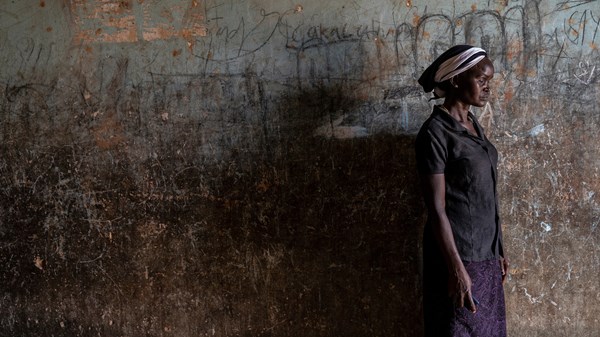 Image: Gary S. Chapman / CT
Image: Gary S. Chapman / CTAt the Church of Christ in Nigeria congregation, Sunday morning worship opens with the din of a military-style drumroll. Inside a long, one-room building with a sheet-metal roof supported by handmade trusses, the uniformed Girls’ Brigade choir takes turns singing and dancing—younger girls on the left and women on the right. A wide-eyed child clings to a djembe played by his mother.
Next to her, a young drummer bears a dramatic scar across her left cheek. It is a reminder of the day, eight years ago, that the evangelical church and surrounding homes in this community of Christian farmers south of Jos were razed by Muslim extremists.
Other markers are less subtle. Beyond rebuilt houses with soaring live-cactus fences, amid rice and corn fields where a dozen goats are tied to stakes, sprawls an enormous concrete slab with a thin, rusty metal cross on top. Entombed there are 483 victims from the attack, stacked in three rows.
A plaque on the mass grave cites Revelation 6:10–11:
They shouted in a loud voice, “Almighty Lord, holy and true, how long will it be until you judge them on earth and punish them for killing us?
Each of them was given a white robe, and they were told to rest a little while longer, until the complete number of their fellow servants and fellow Christians had been killed as they had been.
The verse would prove prophetic: Days after Christianity Today visited the site, Muslim extremists killed more than 200 people across a dozen nearby villages, prompting outrage from Nigerian Christian leaders wearied by years of the crisis with little response from their federal government or from abroad.
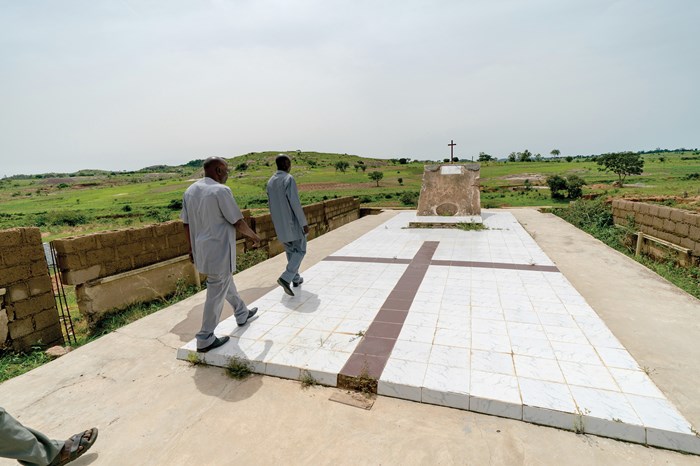 Image: Gary S. Chapman / CT
Image: Gary S. Chapman / CT
Bulus Ezekiel, a local evangelist, escorts a visiting pastor to the mass grave in Dogonawa (now called Dembrook) where Fulani militants massacred almost 500 Christians in 2010. He says an annual memorial service was canceled after too many villagers fell ill from grief.
After worship that Sunday, a police escort walks from the tomb with a radio on his hip, bouncing next to his AK-47. Over the airwaves comes the Nigerian version of a familiar hymn: “Savior, Savior, hear my humble cry; while on others thou art calling, do not pass me by.”
Evangelical leaders in Africa’s most populous nation would apply that last phrase to their American brothers and sisters and the US government. Amid global attention on ISIS in Iraq and Syria for its persecution of Christians, in Nigeria two other groups of Muslim extremists—Boko Haram and Fulani herdsmen—have killed and displaced about as many believers in recent years.
During ISIS’s peak, Boko Haram was formidable, rivaling the Islamic State in deaths and displacement, according to the Global Terrorism Index. Today, the Fulani conflict has surpassed Boko Haram as Nigeria’s greatest violent threat, killing more than 1,300 Nigerians from January to June alone—six times higher than Boko Haram’s death toll, according to the International Crisis Group.
As fans cheered teams at this summer’s World Cup, CT traveled to Nigeria to visit displacement camps and interview Christian leaders in five states in the so-called Middle Belt, where the nation’s mostly Christian south meets its mostly Muslim north. Nigeria currently ranks No. 14 on Open Doors’ World Watch List of the countries where it is hardest to be a Christian. Nearly everyone CT spoke with argues it should rank higher.
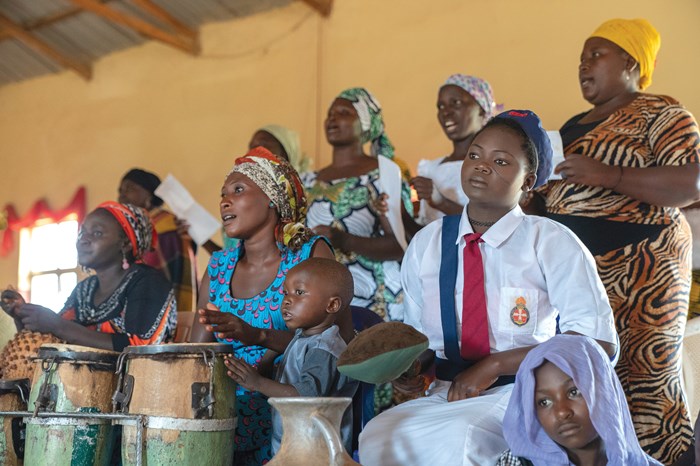 Image: Gary S. Chapman / CT
Image: Gary S. Chapman / CT
…
Entering Nigeria’s capital, Abuja, from the south, vehicles pass a towering sculpture bearing twin spires and the words “You Are Welcome.” A cutout of Nigeria, painted green and white like its flag, hangs between the spires on taut cables that look like they could tear the shape in two.
It’s inescapable that Nigeria is a highly religious place. On the road from Abuja’s airport, every third billboard advertises the ministry of a megachurch pastor. On evening TV, there are as many megachurch infomercials as there are World Cup ads. Roadside businesses have names like God’s Will Furniture, Winning Divine Favor Lighting, and God’s Son Chikun Feed. Where many US gas stations would have a standalone car wash, many Nigerian ones have a small mosque.
Traffic on the main road from Abuja toward Jos is at a standstill, backed up four cars wide as far as the eye can see. The reason isn’t the end-of-Ramadan holiday traffic; a group of about 100 Muslim men are conducting their mid-morning prayers across all the westbound lanes. A short distance down the road, throngs of Muslims stream past roadside mattress vendors toward a large mosque. Driving slowly through them is a white church van with a prominent slogan: “Repent or perish.”
In such a fraught sectarian environment, Nigerian Christians aren’t shy about their evangelism. The word missionary labels the rear doors of many church vans. But also omnipresent alongside the roadways are grazing white cattle—the kind the Fulani herd. Boko Haram, an Islamist terrorist group whose name loosely translates to “Western education is sin,” has been concentrated (and contained) in Nigeria’s three most northeastern states in its failed attempt to establish a caliphate next to Cameroon, Chad, and Niger. But the Fulani, a sizable tribe of nomadic Muslim herders, are present throughout Nigeria and pose a greater security concern as more of them radicalize.
Today, travel through even majority Christian areas is interrupted by frequent security checkpoints, where women and children swarm each waiting vehicle and thrust bundles of bananas, carrots, or cashews through the open windows, trying to make a sale. But the vendors scrutinize and hassle travelers more than most soldiers manning the roadblocks do. (Upon learning the driver is a pastor, one soldier asks, “In church, they give offerings, right?”—a polite attempt at extortion.) Most of the roadblocks are labeled “Operation Safe Haven”—an irony given that many northern Christians who fled Boko Haram came seeking just that in the Christian stronghold of Plateau state and its capital, Jos.
Instead, like the Church of Christ in Nigeria (COCIN) congregation with its mass grave, they found Fulani radicals.
Most denominations in the north can point to churches destroyed and lives lost, but the three hardest hit are evangelical ones: COCIN, the Evangelical Church Winning All (ECWA), and the Church of the Brethren (EYN). “Our stories are not heard,” Dachollom Datiri, president of COCIN, tells CT. More than 1,000 of his members in 50 communities have lost their homes and churches to Fulani attacks. “The effect on the church has been devastating,” he says. “You hear needs from left, right, and center. You are woken up in the night by phone calls, and you are at a loss of what to do.”
Datiri tries to preach sermons that will encourage his struggling people. “I use most often James [1:2]: ‘Count it all joy when you face trial,’ ” he says. “But it is becoming harder to count it all joy. For the past month, trial has been every day. It has been incessant.”
The official government narrative is that the violence is economic, not sectarian. It’s a perennial clash between mostly Muslim herdsmen and mostly Christian farmers over suitable land, they say, aggravated by the Sahara Desert encroaching farther south and by some Nigerian states passing anti-grazing laws that the herdsmen see as unjust. Evangelical leaders vigorously dispute this.
“If you get the narrative wrong, then you get the solution wrong,” says Yunusa Nmadu, general secretary of ECWA and its 5 million members. “The government doesn’t want to call it what it is: terrorism.”
“I’m 51 and have lived all my life as a northerner,” says Nmadu, who lived in Kaduna until moving to Jos last year. “From time immemorial the Fulani have lived among us. Yes, there was conflict; sometimes cows eat the produce. But the Fulani only had sticks. All of a sudden, they start carrying AK-47s. Who gave them the funds and the training? For me, it’s just Boko Haram changing tactics.”
In 2015, a delegation from the US Commission on International Religious Freedom visited Nmadu in Jos. “They asked me what was my fear. I said that Fulani attacks would increase, because we will have a Fulani president and they will feel emboldened.
“If that was a prophecy, it has come true,” he says. “But it’s not rocket science; it’s a simple analysis.”
Throughout the Middle Belt, stenciled signs for ECWA, COCIN, and other churches line the roadside as frequently as ads for Coca-Cola and cell phones do in other countries. The second-most-common signs are for political candidates running in the upcoming national election in February 2019. (“In God we trust” is a common slogan—for Muslim candidates.) The most consequential: whether current President Muhammadu Buhari, a Fulani himself, will be granted a second term.
Christian circles are rife with conspiracies over to what extent Buhari’s administration is instigating the current crisis; at the very least, it’s clear that Fulani radicals are pushing their limits against Christians just like radical Hindus are under fellow nationalist Prime Minister Narendra Modi [see “Outpacing Persecution,” November 2016].
…
Back in Abuja, the government has built a towering monument halfway between Nigeria’s massive national mosque and national church. It resembles a torch. But while the northern states feel highly flammable, the capital is surprisingly peaceful for a center of government. This is mainly because many people live in satellite cities like Gwagwalada, where on a Sunday night about 200 former residents of Jos have gathered to break a fast and passionately pray for peace.
“Enough is enough!” declares one of the pastors hosting Plateau Prays, an annual event, at a COCIN church. “The time has come. I pray that God will answer our prayers.” As the congregation breaks their fast with okra stew and fufu, a common Nigerian dish made from semolina flour, leaders go backstage to the pastor’s office and trade stories of newly displaced arrivals or of members who were ambushed. One leader keeps muttering “Jesus!” He means it as a prayer, but it sounds like a swear.
“There’s not one person in that service whose family has not been affected. Not one,” says Kyauta Damulak, president of the Plateau diaspora in Abuja, as he blots away tears with a gray plaid handkerchief. “I worry this will be a long dark night for us. Our only consolation is in the Scriptures—that when people repent and turn to God, he will aid them.”
Aaron Ndirmbita, pastor of the COCIN church hosting the event, is from Chibok, the northeastern city where 276 schoolgirls were kidnapped by Boko Haram in 2014. (Despite #BringBackOurGirls activism, more than 100 remain unaccounted for.) He was also head pastor of COCIN Headquarters Church in Jos when it was attacked in 2012; the wreckage of the suicide bomber’s vehicle is still preserved in the courtyard.
“We remember the way God saved us,” he explains. That Sunday, he was preaching to 1,200 attendees seated in the basement—the main sanctuary was under construction—when the assailant’s van got stuck after running over a motorcycle and exploded mere meters from the building, demolishing Ndirmbita’s office and his house but killing only four people. “It was a miracle,” he says. “We need to remember the hand of God.”
Many analysts worry about Nigeria becoming the next Central African Republic, riven with reprisal attacks by uncontrollable Muslim and Christian militias. Ndirmbita worries about his nation becoming Egypt or Algeria. “We are students of church history,” he says. “History tells us that [such places] were once Christian and then Islamized.” (While in today’s Nigeria the two religious groups are evenly split at about 100 million each, by 2050 the Pew Research Center projects Muslims will outnumber Christians by 75 million.)
Such fears amid the 2018 surge in Fulani attacks are best illustrated in Benue, the state known as the nation’s breadbasket. Green and lush during the rainy season, small farms of cassava and yams line the red earth roads as far as the eye can see. Frequent roadblocks interrupt what would otherwise be an idyllic drive. Whereas once the main threat would have been the bad roads, now the sectarian troubles of Nigeria’s northeast have come into one of Nigeria’s Christian strongholds. As one election sign says, “The days of jokes are over.”
In the state’s capital, Makurdi, a large sculpture of a Nigerian cornucopia dominates the central roundabout. Just outside the city, however, farmers are seeking safety in one of eight camps for internally displaced persons (IDPs) that the Benue government opened this year after a recent anti-grazing law triggered a surge of attacks by herdsmen. Bamboo scaffolding still encases the outer walls of most structures. Thousands are staying in a large U-shaped building with one wing unfinished. Most men sleep outside (except when it rains) due to overcrowding. “To be a man is not a day job,” proclaims graffiti on one wall. But there is not much for anyone to do other than wait.
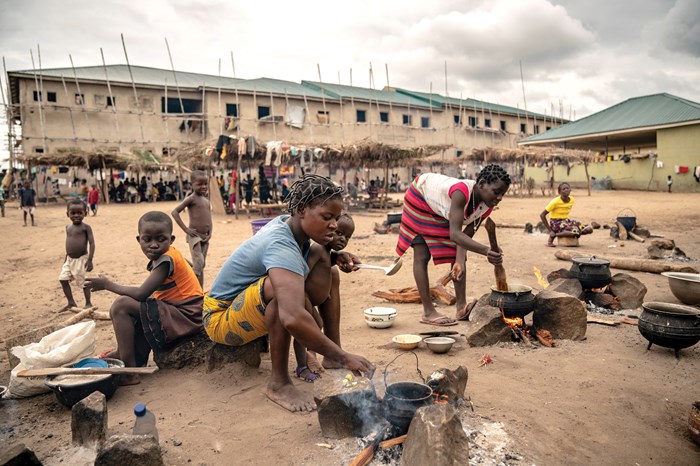 Image: Gary S. Chapman / CT
Image: Gary S. Chapman / CT
At one of Benue’s newest camps for displaced farmers, mothers cook a meager lunch while children gather under thatch trellises in an attempt to maintain their schooling. The Makurdi camp is so crowded, the men sleep outside unless it rains.
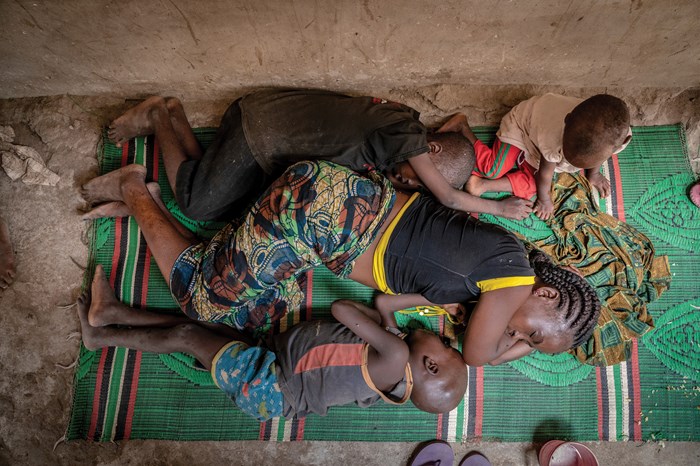 Image: Gary S. Chapman / CT
Image: Gary S. Chapman / CT
Over meager lunches of corn stew, everyone CT interviews wants to return to their homes and their fields. “As they say, there is no place like home,” says Philip, a 42-year-old ECWA member who fled Fulani assailants with his wife and four children, ages 2 to 12. Here he can’t farm or pay school fees.
The camp’s manager tells CT how one couple went back to check the damage. The husband was killed in front of the wife, who was told to come back to the camp and carry the message: “We have taken over. Don’t come back.”
Roughly 90 minutes away in Mbalom, a Catholic church suffered an April attack that made global headlines the same day Nigeria’s bishops were at the Vatican to personally petition Pope Francis about their troubles. Along the narrow dirt road to the church, villages typical of those attacked peek through grass that towers above passing vehicles: isolated clusters of six to ten huts, surrounded by their subsistence fields. Many of their clearings have a handful of small tombs, decorated with blue and white square tiles—where the dead would normally be buried, rather than in mass graves.
At the low-slung church, handmade wood benches form 14 rows of pews before a white lectern with a small cross and a basic altar draped in green. Only the front third has walls, rusty sheet metal now perforated with bullet holes. Congregants who survived the attack explain how the assailants rushed from behind the church-built school to the left as soon as the bell rang to start the service that fateful Sunday. A banner memorializes the two priests killed. Nothing marks where the other 17 bodies fell as people rushed toward the nearby market, vacant since the attack, whose buildings form a large square shaded by towering mango trees.
Gbinde Godwin, a church member whose brother died in the attack, explains how he has sent his four kids, ages eight to two, to family hours away. The cow is now a symbol of fear: that herdsmen are nearby and could attack again. Upon seeing a cow, the 28-year-old farmer explains, “the community will start running. Oh my God, my God, I won’t stay here.”
…
Just over one of the bridges spanning the massive Benue River that bifurcates Makurdi, Yimam Orkwar, a former chairman of the state chapter of the Christian Association of Nigeria (CAN), debates politics with a colleague at Faith Cathedral. They argue whether President Buhari, a patron of the Miyetti Allah Cattle Breeders Association of Nigeria, should be impeached. “Have you seen a country where cattle are valued more than human life?” he asks. Often the Fulani killings will be framed as retaliation for stolen cattle. He wants to know where the allegedly missing cows could have gone; he can certainly show visitors the graves of the scores of farmers.
A New Year’s Day massacre in Benue may have been the first many outside Nigeria had read about the crisis, but it was the 47th attack in four years, explains Bishop Mike Angou, chairman of the state chapter of the Pentecostal Fellowship of Nigeria. Leaders want to build a chapel at the nearby mass grave where the 73 victims were buried, as “a petition to the world,” according to one.
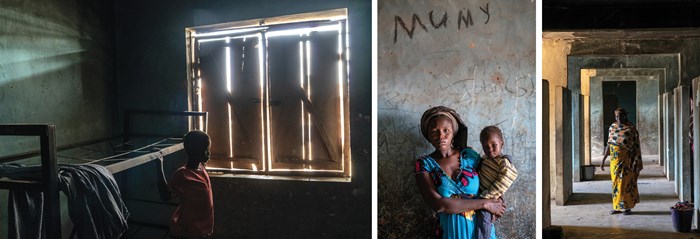 Image: Gary S. Chapman / CT
Image: Gary S. Chapman / CT
“The people are very disgruntled. It was horrifying to see 1 person bury 73 people,” Angou says, as Japan scores its first goal over Colombia on the nearby TV. “Then 23 were killed. Then 17 were killed. Then 50 were killed.” He rattles off attacks and their grisly details. Colombia ties the game, but Angou doesn’t notice.
Across dozens of interviews, Nigerian church leaders told CT they encourage their congregations to follow Jesus’ example and turn the other cheek. One source of perseverance: Leah Sharibu, a Dapchi teenager kidnapped in February by Boko Haram whose refusal to renounce Jesus has left her imprisoned but made her an inspirational meme on many Christians’ social media profiles or smartphone wallpapers.
But now that Fulani violence has eclipsed Boko Haram, beleaguered believers complain they have no cheeks left to turn. Angry youths sometimes attack Fulani or their cows, though on a smaller scale than the violence that necessitated mass graves. “The people have been pushed to the boiling point,” Orkwar says. “There’s a limit to when you can pacify them with the Word of God.”
ECWA’s Nmadu worries that reprisal attacks could morph into something worse. “We are on the precipice,” he says. “If Nigeria goes into civil war, all of West Africa is gone. The immigration crisis will be damningly catastrophic for Europe and America.”
“I am not a prophet of doom,” he says. “But it looks like we are very close to it.”
In neighboring Nasarawa state, 72-year-old Bishop Masin was asked to return to the CAN state chairman position he’d held twice before because he was once quartermaster general of a tank battalion of 14,000 soldiers. “I don’t hold a gun anymore, but I have a mouth,” says Masin, who pastors a large Pentecostal church full of displaced believers in the state capital, Lafia. “And I have no fear to talk to the government face to face.” He encourages members of his church not to resort to guns themselves. “I say I am fighting for them; let them not fight back,” he said. “Instead of the gun or bullet or knife, I fight with paper. We want to document and take people to see.”
Masin shows his tally of local attacks in 2018. It includes 314 villages; many have photo evidence, compiled by local farmers associations. His smartphone displays a May protest march in Lafia that drew thousands; one woman holds a “Free Leah” sign while everyone around her waves clumps of tall grass. “The herdsmen are looking for grass. Is there any grass in the church?” he says of the Catholic massacre in Mbalom. “That’s what we came out in protest: to bring our cry to the world to hear.” Behind his desk hangs an embroidered cityscape of Jerusalem—his reminder to pray for its peace. Masin wishes more people around the world were praying for the peace of Nigeria.
Currently, Christian leaders are putting their worldly hopes on the 2019 election as a chance to remove Buhari and his Fulani-friendly administration. Churches across Nigeria are campaigning for members to arrive the following Sunday with their “PVCs”: permanent voter cards. Some have even made it a requirement for taking Communion—a sign of how serious they are taking the 2019 presidential vote.
The PFN’s Angou estimates nationally only 1 in 4 Christians has their PVC. He says the effort in Benue hopes to hit 90 percent. “This seems to be the only way out,” he says. “We cannot carry arms. And we are law-abiding. Christians have to come out and vote in 2019.”
In the meantime, many Nigerian Christians have dedicated their lives to serving those on the frontlines of the crisis. One noteworthy example: a camp for children displaced by both Boko Haram and the Fulani. It was founded a decade ago by a Fulani Muslim convert, whose family persecuted her for leaving Islam. She had a vision to create a place of refuge for children like herself. It soon swelled to 300 youths, who receive shelter and food but also discipleship. A team of them recently placed first in a national Bible memorization competition.
Beyond the camp, a peaceful sea of green farmland bearing maize and potatoes stretches to the foggy horizon. But the camp director says recently they could see smoke and flames on the horizon from a Fulani attack. “The kids were so fearful. They started packing their bags to run away,” he said. “We had to calm them and pray for God to protect us.”
Closer to Abuja, at a food distribution at Gurku Interfaith Relocation Camp, about 100 displaced women and children have gathered under the shade of a mango tree to receive cereal bowl–sized rations of maize and rice and bags of shoes and clothing. The US ambassador and other American officials are visiting the site, among Nigeria’s many IDP camps, for one unique reason: It is a place where displaced Christians and Muslims have agreed to live side by side.
Its founder, Markus Gamache, the chief liaison for the Brethren church, didn’t plan to create a national case study that the US government would highlight. He was trying to reduce the burden of hosting 60 displaced people at his house, where he already had a family of 13. The first places he went, community leaders told him they would kill any Muslims that came. He finally found a host—in the bush, far away from the main road. Partially for safety, but mostly because the displaced farmers couldn’t cultivate food for their families in the cities.
Gamache also created the camp because he wants Christians and Muslims to live together, as before their displacement, for evangelism. “You can’t preach to someone two kilometers away—even if you shout,” he says. “You need to whisper the love of Jesus when they are next to you.”
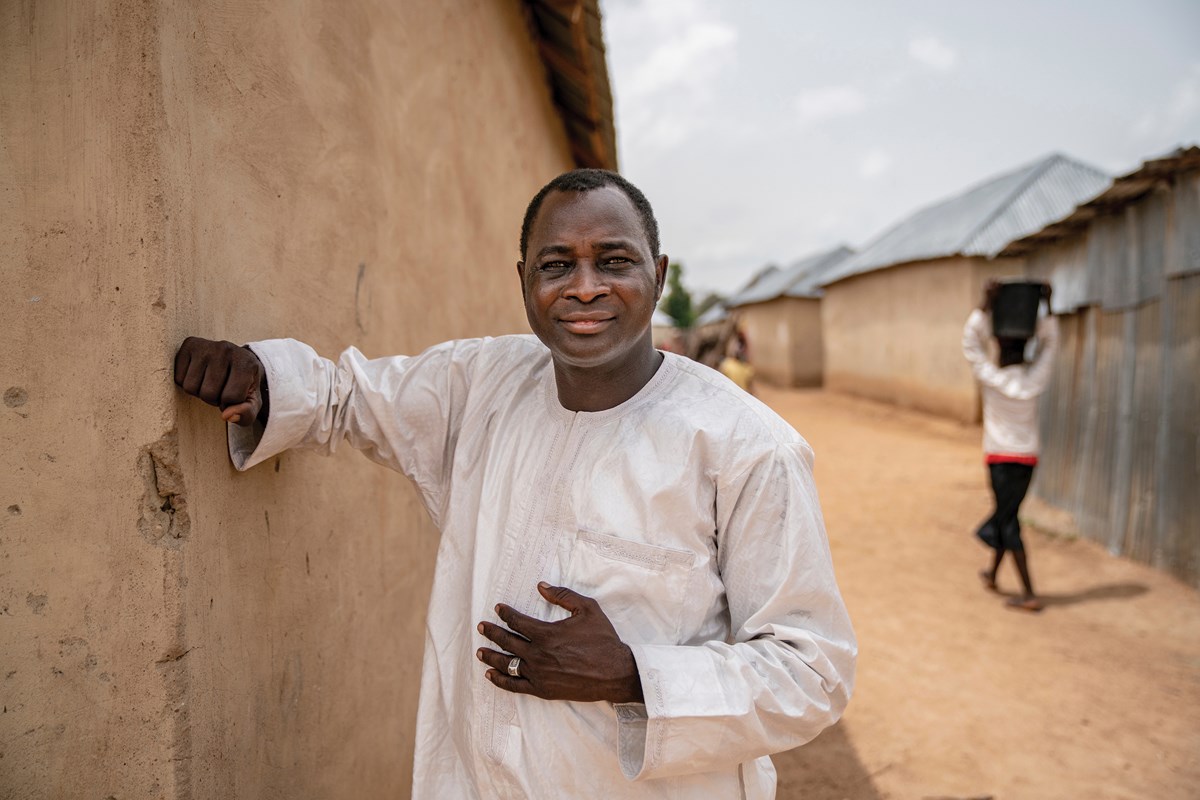 Image: Gary S. Chapman / CT
Image: Gary S. Chapman / CT
Markus Gamache, a Christian convert with a Muslim family, founded a successful interfaith IDP camp (above) because “you can’t preach to someone two kilometers away—even if you shout.” He also has a camp for Brethren families (below).
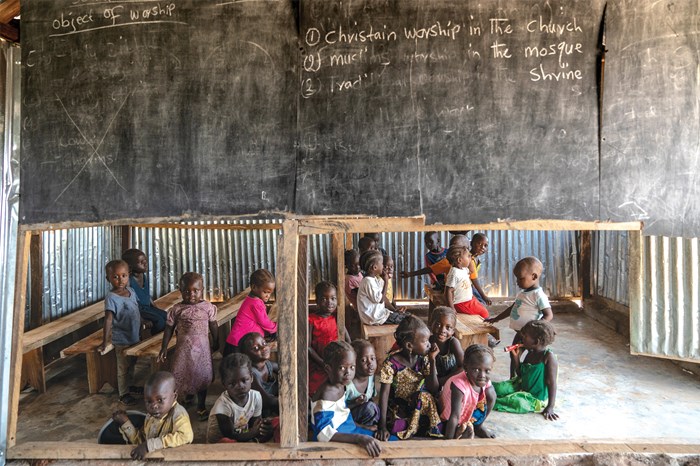 Image: Gary S. Chapman / CT
Image: Gary S. Chapman / CT
Back at the youth camp, a group of girls accompanied by a spirited drummer sing a praise song to Jehovah, which after an 8x refrain, “Where shall I run to?” is followed by:
I run to the mountain, the mountain said no
I run to the hill, the hill said no no no
I run to the ocean, the ocean said no
I run to my God, my God has answered me.
The worship song is about a “sinner man” but feels apropos to Nigerian Christians at large. Consider the theme of the year for ECWA’s 10,000 churches: “Joy in Suffering,” based on 1 Peter 4:13. “You are not alone in your suffering,” says Nmadu. “God is with you.
“For the Christian, persecution is inevitable; Jesus himself promised us persecution. All we can do is reduce its effect,” he says. “Whatever happens, this world is not our home. We have a better home, where one day all this persecution will cease.”
Jeremy Weber is deputy managing editor of Christianity Today.








